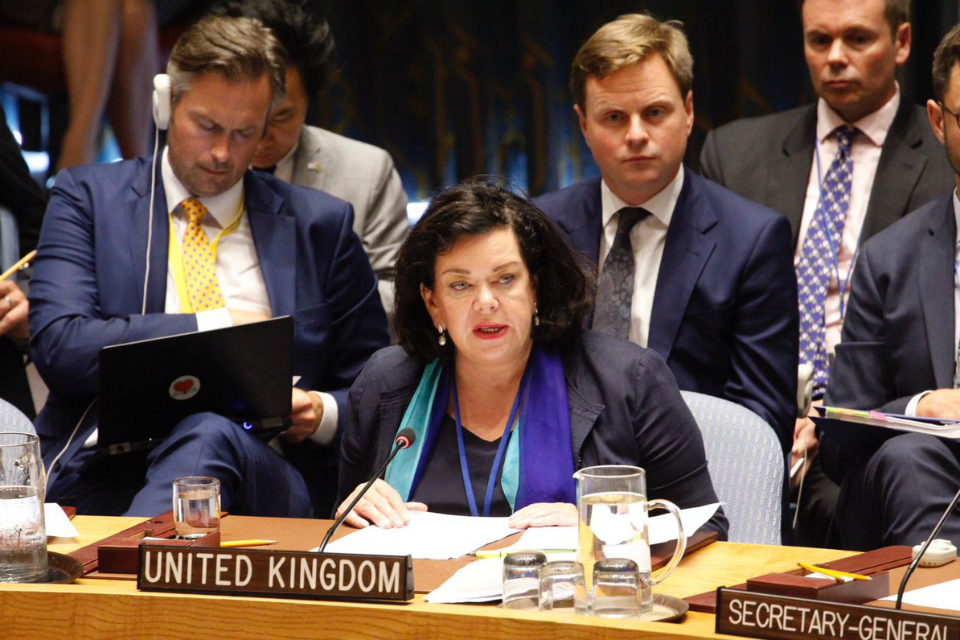Preventing Chemical Weapons Use in Syria
Statement Ambassador Karen Pierce, UK Permanent Representative to the United Nations at the Security Council Briefing on Syria Chemical Weapons

Thank you very much indeed Madam President and thank you to that High Representative for her briefing and for all the work that she is doing on this with her team, and also through her, can I thank the staff of OPCW in the Hague.
Like other speakers Madam President, we remain deeply concerned about the escalating military action by the Syrian authorities and Russia in northwest Syria. This puts millions of civilians at risk and the Security Council will discuss that tomorrow. But in that context, why we’re here today: we are seriously concerned by the potential for further illegal use of chemical weapons in any Syrian regime offensive in Idlib. As other speakers have done, we reiterate that the use of chemical weapons is a breach of the Chemical Weapons Convention and it constitutes a threat to international peace and security.
I was very interested in what the High Representative had to say about their review of the Syrian CW disclosure. I think she’s right to say that some important steps have been made in pursuant of Security Council Resolutions implementation but also right to say that there are some very important outstanding issues. As of March 2018, the OPCW fact finding mission had confirmed 13 cases of likely chemical weapons use in Syria since it was established in 2014. And in terms of allegations, the fact finding mission have recorded at least 390 allegations. After more than four years of work by the declaration assessment team, the OPCW still is unable to verify that the Syrian declaration is accurate. And we’ve heard many times that there are “gaps, inconsistencies and discrepancies” in Syria’s account of its declaration under the CWC.
These are substantive points. I think the Council doesn’t really understand why it’s so difficult to resolve this issue. If a Member state of the United Nations were acting in good faith under the Chemical Weapons Convention, these issues would be capable of being resolved. But we still, Madam President, find ourselves confronting them in this chamber, session after session. And I would like to state that the last report noted that the list of issues has even increased rather than decreased, and I would like to know why. And I hope that the Syrian representative will be able to give us an explanation of that today.
Turning to the risk of the use of chemical weapons over Idlib and taking account of what the Russian representative said: Agatha Christie is a fiction writer. What’s fact, Madam President, is that the Syrian Authorities have been found to have used chemical weapons against their own people. So what we hear from the Russian Ambassador is an inversion of the facts; an inversion of the concern for protection of civilians that this Council has mandated; an inversion of what the rules based international order, of multilateralism is all about; and fundamentally, an inversion of what governments are supposed to do, which is their first duty - is to protect their people and to keep their people safe.
And I just find it unconscionable, Madam President, that after all these years, in the hundredth anniversary year of the end of the First World War, that any government can even think of using chemical weapons against its own people or indeed against anyone else – whether they’re a small city in Britain or they are a country like Syria.
And I reject everything the Russian Ambassador said about P3 aggression. What France, the United Kingdom and the United States are aiming to do is to uphold the rules-based international order. People who worry about action by our three governments should take every possible step to ensure that chemical weapons are not used and then there will be no problem at all. But we have demonstrated, Madam President, that we will respond swiftly and appropriately to any further use of chemical weapons by the Syrian regime and which has already had such devastating humanitarian consequences for the Syrian population.
Once again, I join others in urging Russia to use its influence to ensure that chemical weapons are not used against civilians in Syria. Either Russia calls for restraint or Russia will be deemed complicit in their use when these weapons are used.
And I just want to conclude if I may by saying I couldn’t agree more with the representative from Equatorial Guinea about the primacy of the political process and I hope that those efforts can be redoubled over the coming weeks.
Thank you Madam President.